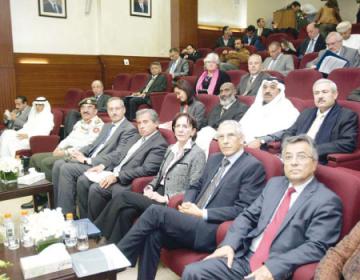
UN Under-Secretary General and ESCWA Executive Secretary Rima Khalaf said that technology is the practical application of knowledge and the most important to produce optimal outcomes in all the interrelated areas of development. She said that the UN has always been a global player in promoting and harnessing technology for development, noting that by 2015, 50 per cent of world population will be connected online. Khalaf was delivering the opening statement at the Regional Preparatory Meeting for Western Asia in support of the 2013 Annual Ministerial Review (AMR) of the UN Economic and Social Council (ECOSOC) on 26 November 2012. Hosted by ESCWA Technology Centre in Amman, Jordan, the Meeting was held under the theme: "Science, Technology and Innovation, and the Potential of Culture, for Promoting Sustainable Development and Achieving the Millennium Development Goals (MDGs)." Khalaf added that the global commitment is further confirmed in the many resolutions adopted by ECOSOC, the Regional Commissions and specialized UN agencies. "These resolutions constitute a strong legislative mandate for concrete joint programmes and activities that revolve around three principles: humanity commands a great pool of knowledge and ideas to solve the most challenging problems; global technology progress is a catalyst for changing consumption patterns towards more sustainability; and free and open-source collaborations and solutions are the most viable platform for innovation." The Executive Secretary noted that in the second decade of the 21th century, where knowledge determines the fortune of nations, the Arab region will have to rely on technology for future socio-economic progress that has a critical role to play in maintaining sovereignty, quality of life and productivity, and decent employment. Jordanian Minister of Planning and International Cooperation Jaafar Hassan participated in the meeting and delivered a statement, in which he said that alternative energy sectors, technology, green industries and biotechnology are the most important areas to overcome the resource challenges in many countries, including Jordan. He added that they are closely linked to knowledge-based economy and the raise of productivity in other sectors to address youth unemployment especially among university students. He pointed out that Jordan can take pride in its achievements at the level of contributing to the establishment of a favorable environment for innovation through his accomplishments in the field of education over the years and passed decades. This leads to building a leading innovative and knowledge-based economy to achieve economic and social development. Hassan also stressed on one of the main factors leading to raise productivity and competitiveness of economic sectors that is strengthening partnership between the public and private sectors, and the productive and scientific sectors in policy development and program planning to support and expand the competitive market; national strategy development through effective partnerships with universities and scientific institutions; and guidance of applied researches on development and innovation in the industry, services and agriculture. Director of ECOSOC Support and Coordination at the UN Department of Economic and Social Affairs (DESA), Navid Hanif, delivered the Council's statement on behalf of Desra Percaya, Vice-President of ECOSOC and Permanent Representative of Indonesia to the UN. He said that scientific output is surging, and over the past decade, Western Asia's share of global publications rose faster than any other region, accompanied by new sparkling research clusters. He added that the seismic shift happening with the online learning is reshaping higher education by broadcasting access and reducing costs. Participants in the meeting included UN officials and representatives of private sector and concerned parties. The meeting featured two round table discussions entitled "Enabling Productive Capacities in Science, Technology and Innovation in Western Asia" and "Harnessing Global Knowledge and Technologies for Regional Sustainable Development Initiatives," and moderated by Fouad Mrad, Executive Director of ESCWA Technology Centre, and Thomas Stelzer, Assistant Secretary-General for Policy Coordination and Inter-agency Affairs at DESA.





